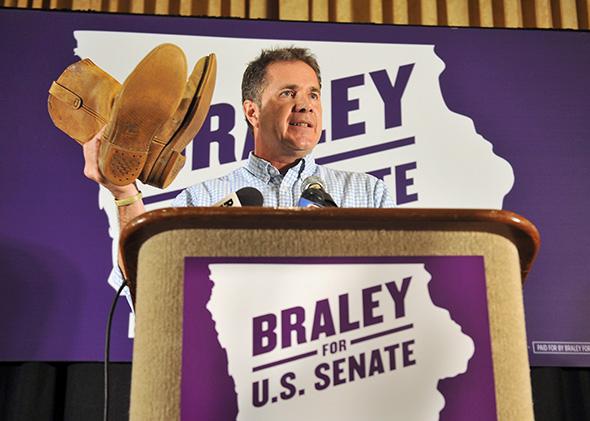“I am beyond thrilled,” Michelle Obama told a crowd in Des Moines, Iowa, earlier this month, “to be here today to support your next senator from Iowa, our friend Bruce Bailey.” The problem: The man she was stumping for is named Bruce Braley. The first lady made the same mistake six more times over the next 16 minutes. Finally, after she twice urged the audience to visit the nonexistent “vote dot brucebailey dot com,” the crowd couldn’t take it anymore. “Braley!” they shouted toward a stage that featured a giant purple sign prominently displaying the candidate’s correct name. Obama’s abashed response: “I’ve been traveling too much.”
It was an inconsequential mistake, but a fitting one in the unexpectedly tight race to replace retiring Democratic Sen. Tom Harkin. Braley, a four-term congressman without much national name recognition, entered the campaign as a moderate favorite to defend the seat for Democrats. His early lead, though, evaporated in the face of a surprisingly strong challenge from Republican Joni Ernst, a folksy state senator with an extremely conservative track record. The race moved into tossup territory over the summer, and the Republican now leads Braley by somewhere in the neighborhood of 2.5 points. Nate Silver’s FiveThirtyEight and the New York Times’ The Upshot peg Braley’s chances of winning at 34 percent and 40 percent, respectively. The Washington Post’s Election Lab, meanwhile, gives Braley a mere 14 percent chance.
The Democratic Party desperately needs Braley to pull off the comeback win. The Iowa race remains one of the few tossups on the Senate map, and what happens in Iowa between now and Election Day will go a long way toward deciding which party controls the upper chamber during President Obama’s final two years in office. But unfortunately for Democrats, Braley feels like the wrong candidate in the wrong place at the wrong time, and that won’t change even if everyone remembers to call him by the right last name.
Braley’s smooth ride during his uncontested primary came to a quick end when video surfaced of him taking a cheap shot at Republican Sen. Chuck Grassley, suggesting at a private fundraiser that the state’s senior senator was unfit to be the chairman of the Judiciary Committee because he was “a farmer from Iowa who never went to law school.” You don’t have to know that Grassley is one of the state’s most popular politicians to understand why that comment wouldn’t go over well in the heartland. The audience (wealthy trial lawyers) and setting (boozy, out-of-state fundraiser) only made it worse. The “gaffe-prone” label quickly followed—as did the attack ads.
While that high-profile misstep didn’t help, Braley was always going to struggle in a year when voters hate Washington politicians even more than usual. As a member of the most unpopular and least productive Congress in history, Braley didn’t have the luxury of running as an outsider who could shake up the current state of Beltway affairs. And while he is carrying congressional baggage, he lacks the benefits that come from being an incumbent. Democratic Sen. Mary Landrieu, for instance, can sell voters in oil-and-gas-rich Louisiana on the fact that she wields the gavel of the Energy and Natural Resources Committee; Braley can’t even tell Iowans what committees he’ll be on. The fact that he’s defending a seat for the incumbent party without being the incumbent only makes things more difficult. Fair or not, Braley’s pitch to voters can come across as: I won’t fix Washington, but I won’t make things any worse. That’s hardly the stuff of bumper stickers and campaign posters.
With no way around those hurdles, Braley has attempted to crash through them. Unlike many of his fellow candidates in more conservative states, the congressman hasn’t run away from his party or the president. During his debates with Ernst, he offered a strong defense of Obamacare, complete with a personal anecdote about how his nephew, who survived liver cancer as a small child, no longer has to worry about becoming uninsurable due to a pre-existing condition. Braley has also placed Democratic proposals, like increasing the minimum wage and closing corporate loopholes, at the center of his campaign. “Although I may have slipped up on Bruce’s name a couple times, what I know I got right are Bruce’s values,” Michelle Obama told a crowd during a return visit to Iowa earlier this week.
That Braley is trailing is hardly a shock. What is a surprise, however, is who he is losing to. Ernst, a conservative state senator, is best known for a serendipitously timed ad about hog castration. And if you ask liberals, voters don’t know nearly enough about her extremely conservative views. The Republican has logged some serious time out on the conservative fringes, dabbling in U.N. conspiracy theory, backing a “personhood” amendment, and calling for Obama’s impeachment. As my colleague Jamelle Bouie put it last month, Ernst is “not quite Sarah Palin part deux, but she’s close.”
Democrats and their allies have so far been unable to make the “extreme” label stick to Ernst. But as the clock nears midnight, they’re still holding out hope that they can. On Thursday, Ernst bailed on a sit-down with the editorial board of the Des Moines Register, providing the type of opening that Democrats have been waiting for. “It’s no surprise she’s hiding from Iowa editorial boards and TV reporters,” Justin Barasky, a spokesman for the Democratic Senatorial Campaign Committee, told Bloomberg. “This is a campaign on the run and in trouble.”
Braley has 11 days left to convince Iowans that’s true. Voters in the Hawkeye State need to decide between a flawed candidate who’s more likely to preserve Washington’s unpopular status quo and a flashy one who is unlikely to make things any better. If they pick the former, Braley won’t have to worry about Democrats forgetting his name anytime soon. If they choose the latter, he’ll probably be hoping they do.
